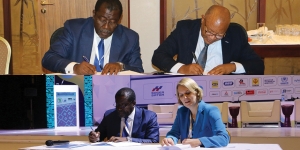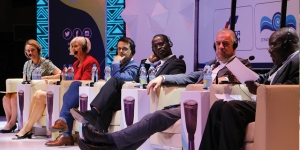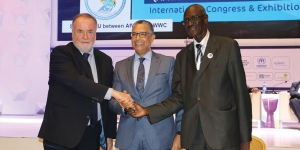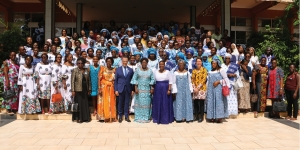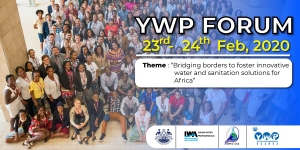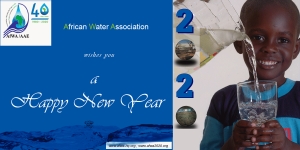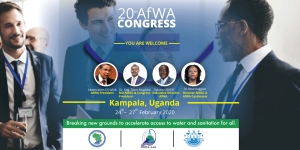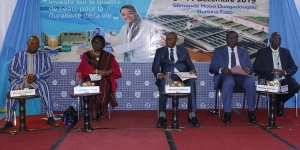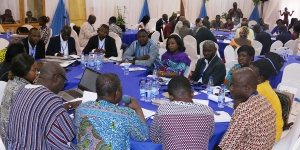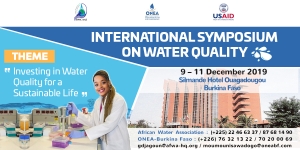Nzickonan Stéphanie
AfWA signs two Memoranda of Understanding to increase its membership and strengthen its capacities
20th AfWA International Congress and Exhibition: African experts are looking for new solutions to improve access to water and sanitation on the continent
The AfWA’s 20th International Congress and Exhibition opened on Monday February 24, 2020 in Kampala, UGANDA, under the theme: breaking new grounds to accelerate access to water and sanitation for all in AFRICA.
2700 delegates from all over the world took part in this meeting chaired by the Ugandan head of state, His Excellency Yoweri Museveni. In welcoming the participants, the Chairman of the Board welcomed the leadership of the National Water and Sewerage Corporation in the water sector and in the African region. Leadership obtained thanks to the financial and political support of the Head of State who has made access to water and sanitation a subject of interest in his country. This, according to Minister of State for Water, Ronald KIBULE, has helped NWSC to gain the trust of AfWA’s Executive Board to organizing the Congress.
Speaking following the Minister of State for Water, Mr. El HAFIDI, AfWA chairman and Managing Director of the National Electricity and Drinking Water Corporation (ONEE) of MOROCCO underlined the importance of opening new development paths for the water sector by using smart solutions, digital transformation, innovative financing, resilience to climate change as well as the development of renewable energies to spread access to drinking water and sanitation services on the African continent.
Closing the series of speeches, President Museveni invited experts from the water and sanitation sector to make additional efforts to make water available in quantity and quality to the populations. These efforts boil down to water conservation, purification, reuse, desalination and management. The President of the Republic of Uganda also urged African water officials to address water issues comprehensively in order to create effective and lasting global solutions to water challenges and threats. "Water issues cannot be tackled in a piecemeal fashion," he said. For him, ministries of health should be involved in such a meeting because water also has an impact on the health of country, and to continue: "we cannot speak of water either without speaking of electrification, because the population must find an alternative source of energy to avoid destroying the forests which bring rain", said Mr. Museveni.
Note that the opening ceremony of this 20th congress was also marked by the passing of the torch between AfWA’s outgoing president, Mr. El HAFIDI and the new president, Dr. Eng. Silver MUGISHA, Managing Director of National Water and Sewerage Corporation - UGANDA.
Signature of an MoU between AfWA and the organizers of the 9th World Water Forum, Dakar 2021
The African Water Association, the World Water Council and the Republic of Senegal through its Executive Secretariat for the organization of the World Water Forum, Dakar 2021, signed this Monday, a Memorandum of Understanding within the framework of the 9th World Water Forum to be held in Dakar, Senegal in March 2021.
The objective of this tripartite agreement is to mobilize public and private sector actors, professional associations as well as all stakeholders of the water and sanitation sector for a strong participation in this Forum, to seek sponsors for the participation of young people, to develop a framework for collaboration between organizations for the sharing of experiences and good practices.
Committed women innovate for access to water and sanitation in Africa
The 3rd Forum of Professional Women in Water and Sanitation took place this Sunday 23 February 2020 in Kampala, Uganda. The theme chosen for this meeting was: "Committed women, innovate for access to water and sanitation in Africa''.
Through this theme, women want to show their involvement in the search for solutions to make water and sanitation services accessible on the continent.
Invitation to Young Water and Sanitation Professionals Forum
The Young Water and sanitation Professionals Uganda Chapter are organising the *Young Water and sanitation Professionals forum* at the sidelines of the African Water Association Congress that will be held in Kampala-Uganda from 24th-27th February, 2020.
The Forum will attract *Future water Leaders* from a number of countries across the globe who will participate and contribute to discussions aimed at creating the "Next" solutions to the water and sanitation sector challenges.
To be part of the discussions, networking opportunities, acquire new knowledge and contribute to solutions that will resolve the challenges being experienced in the sector among others, follow the link below to register.
The Young Water Professionals are a group of youth below the age of 35 years and are passionate about the water, environment and sanitation sector. In Africa, they operate under the auspices of the African Water Association (AfWA) and the International Water Association (IWA) on the international stage.
For more details : This email address is being protected from spambots. You need JavaScript enabled to view it. and/or This email address is being protected from spambots. You need JavaScript enabled to view it.
Happy New Year 2020
The African Water Association wishes you a Happy New Year 2020 and looks forward to seeing you in Kampala, Uganda from 24 to 27 February 2020, for its 20th International Congress and the celebration of its 40th Anniversary.
Read more about the Congress HERE
20th AfWA International Congress And Exhibition : innovation and solution to address water and sanitation issues in Africa
The 20th AfWA International Congress and Exhibition which will be held from 24th to 27th February 2020, in Kampala, Uganda aims to bring together different water and sanitation professionals from various parts of the world. The congress will be innovation and solution focused and will address water and sanitation issues in Africa, new breakthroughs and innovations to accelerate access to water and sanitation for all.
The overall theme of AfWAICE2020 is “New Breaking new grounds to accelerate access to water and sanitation for all in Africa”. This theme is particularly relevant to the water and sanitation sector in Africa. Most African countries are now faced with immense water and sanitation challenges. Never before has the need to face the challenge - to share ideas and resources; to look for new breakthroughs and innovations; to cooperate between nations, between generations and between disciplines – been more urgent.
Read more about the Congress here
International Symposium on Water Quality: World Health Organization Representative in Ouagadougou calls on governments to ensure access to safe water for all
Even though access to safe drinking water and sanitation has been recognized as a human right since 2010, 1 in 3 people in the world do not have access to safe water. These alarming data, taken from a new report by UNICEF and the World Health Organization, were highlighted on December 9 in Ouagadougou, Burkina Faso, at the opening of the international symposium on water quality organized by the African Water Association in partnership with ONEA and USAID.
The consequences of this situation are also devastating. Indeed, about 2.6 million people die each year from water-related diseases, making unsafe water one of the leading causes of death in the world.And the human disturbing action is pointed out by Mr. Alassoun Sori, Secretary General of the Ministry of Water and Sanitation of Burkina Faso. For him, "the uncontrolled use of various substances harmful to agriculture, the development in recent years of mining activities with the uncontrolled use of chemicals, the excretion of animals in surface waters, generate various types of pollution and thus the deterioration of water quality,".
To address this situation, Mr Frédéric François KABORE, Managing Director of ONEA, called on the federation of stakeholders to achieve target 3 of Sustainable Development Goal 6 (SDO), which plans to improve water quality by reducing pollution by 2030, by eliminating waste dumping and minimizing emissions of chemicals and hazardous materials, halving the proportion of untreated wastewater and significantly increasing the safe recycling and reuse of water worldwide.
Mr Sylvain Usher, Executive Director of AfWA, for his part, wanted to be pragmatic. He invited his peers to take action." We have a great challenge to overcome. Our countries, and therefore we, scientists, technicians and researchers, should intensify our efforts in terms of water quality. We have the intelligence, skills and resources to do so. Let’s act now because the ODD agenda imposes it on us, and if we don’t do so, it’ll be forever”.
However, these actions will only succed if they are supported by States. That is why, the World Health Organization’s Resident Representative in Ouagadougou, Ms Alimata Jeanne Diarra Nama, called on governments to more involved in issues of access to safe drinking water: "When governments will insure access for everyone to safe water, sanitation and well-managed water resources, the fight against a large number of diseases will be greatly improved."
It should be noted that water quality is not an accidental issue for the African Water Association. It’s a whole programme to strengthen the capacities of the water quality control laboratories of water utilities developed and implemented by AfWA, with funding from USAID. And this symposium was part of a mid-term review of programmes to enable experts to capitalize on the actions undertaken in recent years and provide guidelines for a more effective consideration of water quality by the various stakeholders in the sector and particularly the governing authorities.
Access to drinking water in Africa : Experts in Ouagadougou call on African leaders to systematize the consideration of water quality in water supply projects and programmes
The world faces an invisible crisis of water quality that is eliminating one-third of potential economic growth in heavily polluted areas and threatening human and environmental well-being, according to a World Bank report. Regarding Africa, the continent continues to face major challenges in the water sector, particularly in terms of access to drinking water and water quality monitoring.
To contribute to the improvement of this worrying situation and support the African Ministers' Council on Water (AMCOW) in the African Water Vision 2025, AfWA has committed itself to developing programmes to support stakeholders, such AfWA Capacity Building Programme (AfriCap), which aims to promote partnership in the field water’sector.
To assess the progress of this programme, AfWA, in partnership with the National Water and Sanitation Office of Burkina Faso and USAID, organized the 1st International Symposium on Water Quality in Ouagadougou, Burkina Faso, from 9 to 11 December 2019. Under the theme: "Investing in Water Quality for a Sustainable Life", this symposium brought together about 100 experts, as well as development partners, donors and students from 12 African countries and 2 European countries. The objective was to share experiences, capitalize on the actions undertaken during the implementation of the programmes and define guidelines for better consideration of water quality by the various stakeholders in the sector and by the governing authorities.
Over two days, experts gathered in Ouagadougou discussed the challenges, financing, capacity building, policies and regulations of the water sector in Africa. At the end of their work, they formulated recommendations contained in the following Declaration.
DECLARATION OF OUAGADOUGOU
We, participants of the international symposium on water quality, meet in Ouagadougou, Burkina Faso, on December 9-10, 2019, four years after the adoption of the Sustainable Development Goals (SDGs), taking into account targets 1 and 3 of objective 6 related to water quality,
Declare the following:
Considering that universal access to water and adequate sanitation constitute human rights recognized in the universal charter of human rights to which most of African countries have subscribed; Considering that the deterioration of the quality of water resources affects the ecosystem, health of consumers and increase drinking water production costs;
Considering that one of the strategic tools use by most of African countries to ensure water quality is the Water Safety Plan (WSP),
Realizing that water security is a key factor in the socio-political and economic development of Africa,
Convinced that without adequate policies and regulations, followed with enough material, financial and human resources in quantity and quality, the implementation of the control and monitoring of water quality cannot be effective
Edified by the fact that the development of North-South and South-South partnerships through different networking channels constitutes one of the important levers for strengthening the capacities of local actors through benchmarking and peer-to-peer,
Agree on the following recommendations:
In terms of policies and regulation:
1. To develop and implement binding policies for water users with a view to ensuring water safety;
2. To develop a synergy between existing consultation frameworks and popularize their results;
3. To systematize the integration of water quality aspect in water supply projects and programs;
4. To develop environmental education for school children and households;
5. To take incentives for private investors on water quality;
6. To promote the development of African water quality guidelines.
In terms of capacity building:
1. To encourage partnerships between water companies (WOP);
2. To align training curricula with the needs of water quality control laboratories;
3. To mutualize the resources of existing training centers and universities in the countries;
4. To strengthen the partnership between research institutes and water companies on water quality issues;
5. To raise awareness among stakeholders (industrial, mining, etc.) on anti-pollution measures for less polluted raw water
In terms of financing:
1. To mobilize various taxes (polluter pays, levy, VAT, etc.) and environmental taxation for the financing of water quality;
2. To exonerate taxes on the acquisition of equipment and consumables for water quality monitoring;
3. To strengthen advocacy for the mobilization of donor funds for water quality monitoring;
4. To advocate for an allocation of resources for quality monitoring;
5. To mobilize and implement an investment to equip water quality laboratories.
Done in Ouagadougou, on 11 december 2019
International Symposium on Water Quality, from 9th to 11th December 2019 in Ouagadougou, Burkina Faso. Theme: "Investing in Water Quality for a Sustainable Life"
The African Water Association (AfWA) is pleased to inform WASH stakeholders, members and development partners that a SYMPOSIUM ON WATER QUALITY will be organized from 9th to 11th December 2019 in Ouagadougou, Burkina Faso under the theme "Investing in Water Quality for a Sustainable Life".
This symposium will globally aim to mobilize high-level stakeholders around the issue of water quality towards contributing to the associated SDG 6.1 and 6.3. From the exchanges, decision-makers will gain an overview of current best practices on water quality control and stakeholders will benefit from a knowledge-sharing platform on science and technology for presentation of research results and innovations as well, and knowledge transfer benefiting Africa.
Dealine for registration: December 7, 2019
For further information, please contact : This email address is being protected from spambots. You need JavaScript enabled to view it. and This email address is being protected from spambots. You need JavaScript enabled to view it.

 English
English  Français
Français 
